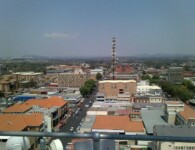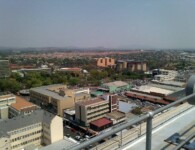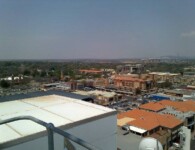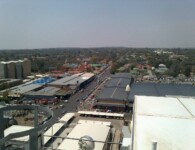(For Information on Tourism in Polokwane see our Tourist Attractions Page)
Polokwane was founded by The Voortrekkers under the leadership of Andries Potgieter on the farm Sterkloop in 1884 providing 150 even covering 2 200 morgens. The city was previously known as Pietersburg. Our city has enjoyed a long history of prosperity and has grown rapidly given its proximity to Gauteng and the rich agricultural district in the surrounding areas.
The town earned city status on 23 April 1992 and is now the major center and capital city of the province. The city Polokwane holds an enviable position. Its proximity to a major center near the neighboring countries of Botswana, Zimbabwe, Mozambique, and Swaziland make it a strategically located, fully equipped destination, and it is within convenient distance from the Kruger National Park and Magoesbaskloof.
Polokwane boasts excellent accommodation, fine weather, and a busy, friendly population, making it the ideal business or getaway destination in the geographic and economic heart of the Limpopo Province.
Polokwane, the capital of Limpopo, is the largest metropolitan complex in the north and a major economic center. Its proximity to the neighboring countries of Botswana, Zimbabwe, Mozambique, and Swaziland, as well as its convenient distance from the Kruger National Park and Magoebaskloof, makes it a perfect gateway and good destination in itself.
Polokwane, the vibrant capital of the province, is one of the fastest-growing cities in the southern hemisphere. Founded in the gold rush days of the 1880s, it has witnessed Stone Age nomads, Iron Age settlements, European migrations, wars and political upheaval. For the tourist in today’s peaceful times, it promises an abundance of fascinating historical sites and attractions.
The historical and cultural attractions of the region are equally varied. They embrace San rock art, a host of legendary characters who made history in the region, the Voortrekkers who arrived here to escape an oppressive regime in the Cape and their conflict with the locals who considered this magical region their home and weren’t always eager to share it. Visitors will gain insight into the tapestry of human drama that unfolded on this land through archaeological evidence unearthed and preserved, the legacy left by the San in their rock art and relics preserved in the many museums and memorials of the region
The region is home to fascinating and diverse people. It is the center for local African culture in which the coming together of carefully preserved social traditions and indigenous identity has taken place. One of the most notable archaeological and historical sites in the country is found at Makapan’s Valley in the region. Here the sediments, fossils, bones, and artifacts found in the caves have revealed a unique record of hominid habitation and evolution dating back 3,3 million years. The valley which has stood at the frontier of palaeontological and archaeological research for much of the twentieth century has been declared a National Heritage Site.
The African Ivory Route which has its origins in the legendary exploits of early ivory hunters and gold traders runs through the Capricorn region. Today the route is an important eco-tourism and 4X4 adventure destination much sought after by safari enthusiasts. Traversing rugged mountainous terrain and stunning wilderness areas, the route will appeal particularly to the person drawn to the African wild. Today good roads traverse the scenic Capricorn region where once wagons and stagecoaches negotiated precipitous declines, and these, together with an excellent tourism infrastructure that includes fine accommodation establishments, encourage tourists to explore and linger in the area.
Out of the vast expanses of bushveld wilderness, roamed by an abundance of wildlife species, rise titanic mountain ranges trimmed with indigenous forests, tranquil streams, and spectacular waterfalls. Much of the Limpopo Province, particularly the Kruger National Park and other game and nature reserves, is unspoiled, providing sanctuary to large varieties of African flora and fauna.
The Limpopo Parks surrounding Polokwane, provide sanctuary and habitat for a variety of African mammals, special plant species as well as water catchments and wetlands of international status. It is these landscapes and the Province’s untamed wilderness that provide a nature enthusiast with a variety of nature-based tourism activities. See this page for fun activities in Polokwane.




